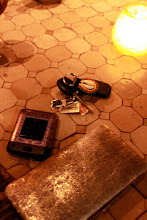A short summary: main character Cecelia Rose Honeycutt has looked after her psychotic mother for most of her twelve-year-old life while her father has been traveling for work--and also to get away from his family's problems. When her mother passes away in an accident, young CeeCee is whisked off to live in Savannah, Georgia with her great-aunt. Over her first summer there, she meets a host of eccentric and loving women who help her begin to heal all the wounds inflicted upon her by cruel circumstance.
The book is a love song to the South (and also a bit of a downer about the North, which I'm sure would rub a few people the wrong way) and a testament to the power of female companionship. It was a bit disconcerting, too, in that though it is an adult's book, it is written completely from the twelve-year-old main character's perspective, which means that sometimes the reader understands things the protagonist does not, and also that the writing seems a bit elementary at times, when really it's just reflecting the protagonist's point of view.
I was touched by the author's brutally honest descriptions of CeeCee's mother's antics, and of the pain that CeeCee feels because of them. A few quotable quotes:
"And now here I was...thinking about how much easier everything would be if my mother was locked up in a sanatorium. I sometimes even wished she were dead. It was terrible to think such a thing, but I just couldn't help it. I'm not saying I wanted to skip through life in a rosy blur from one Disney experience to the next--all I longed for was to know one whole happy day." (22)
"As I knocked on her door, begging her to let me in, I realized I had just taken my father's place: there I was, standing outside her locked bedroom door, frustrated and helpless and just plain tired. Tired of it all." (76)
"I wondered if I'd ever be so lucky to have a girlfriend I'd grow old with, a girlfriend who knew my secrets, my fears, my hopes--and loved me anyway." (111-112)
"I felt selfish and small as I watched my aunt from the kitchen window. She had given me so much, so freely, yet I was unable to do something as simple as sit at her side." (115)
"'But I guess some folks is willin' to pay anything for hope.'" (145)
"'Ain't no sun in the kitchen without your face lookin' up at me.'" (142)
"'Don't go wastin' all them bright tomorrows you ain't even seen by hangin' on to what happened yesterday. Let go, child. Just breathe out and let go.'" (290)
"'It's how we survive the hurts in life that brings us strength and gives us our beauty.'" (302)
Also, I'm not going to lie: with the book consisting of such a female-dominated world, I felt as if homoeroticism was the huge elephant in the room the whole time I was reading. Everyone's husband was dead or divorced with or absent in some other way, but there were just so many women. I almost felt like it was a slight cop-out on the part of the author. I'm not saying she needed some sort of graphic scene of homoeroticism, but she could have hinted at it subtly the way other things were hinted at in the novel. I do applaud her portrayal of free female sexuality, though.

No comments:
Post a Comment